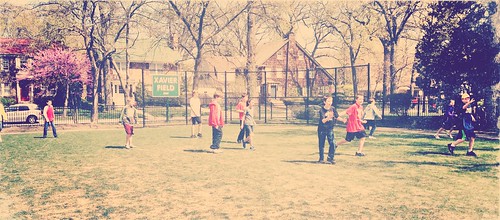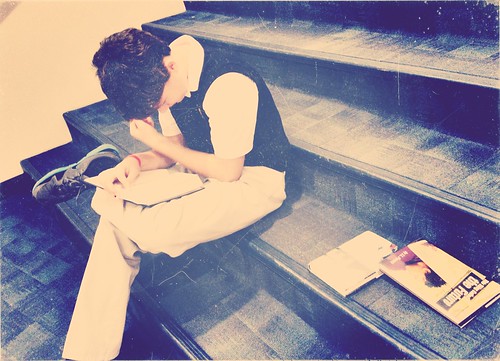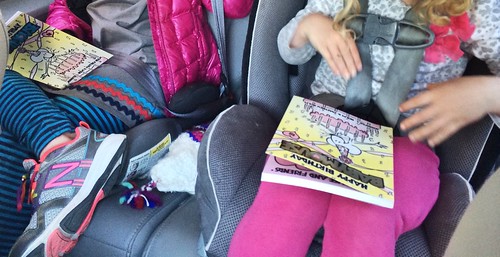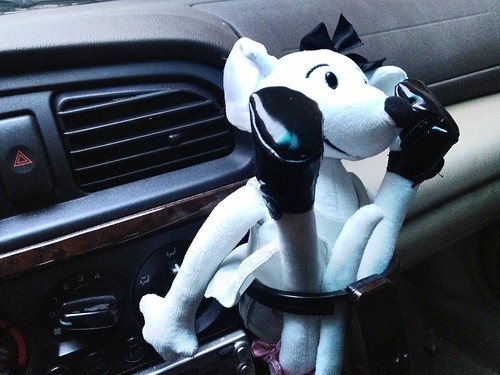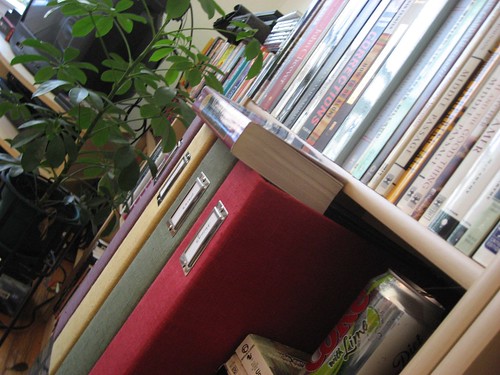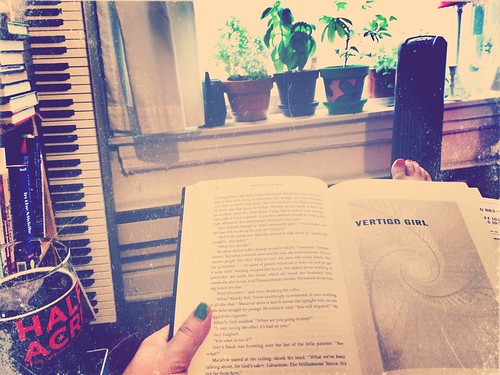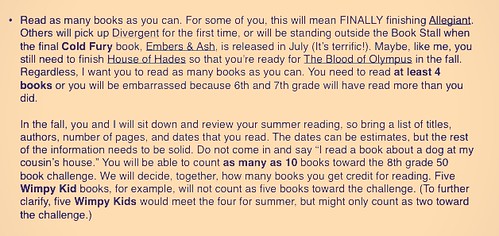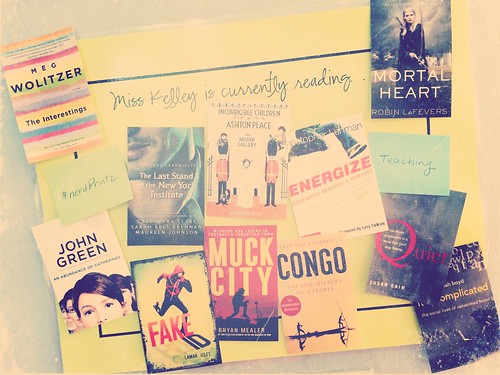
Fake ID by Lamar Giles
"Do you have time to read right now?" Betsy asked as I checked out at the bookstore. "I have a book that I really want you to read." She came back with a finished copy of Fake ID for me to borrow. And while I really didn't have much time to read at that point, I found myself completely drawn in by Nick (or is he Tony?). This book has a mystery and a conspiracy, and it's about what makes a family, and how to be a friend. Or not. I will definitely be adding this book to my classroom library when school starts again, and talking it up to my students. Thank you, Betsy.

One Man Guy by Michael Barakiva
I had to hunt for this book a little at my local independent bookstore, even though their system said it was on the shelf. I finally found it shelved in the Gay section, not YA. Andrew Smith's amazing Grasshopper Jungle was shelved next to it. I'm not sure if the store was trying to get its adult customers to buy these two books by not shelving them in YA, but I was surprised. And yes, One Man Guy is about Alek and Ethan's journey to becoming one man guys, but it's also very much about Alek and his Armenian family. His changing relationships with his brother and his parents are just as important as his new romance with Ethan, and I loved reading about an ethnic group that I hadn't seen before in YA.

Landry Park by Bethany Hagen
I found this book because it had a glowing shelftalker in the bookstore, but then it got shoved aside by some books-I-have-to-read-this-week books and I didn't get back to it until school was out. I'm glad I picked it up again. It's in the style of a moody classic romance (think Jane Austen's Persuasion or Mansfield Park, and anything by Charlotte Bronte), but set 200 hundred years in our future. Class has replaced race and ethnicity as the defining feature in society, and the wealthy have essentially enslaved the poor. I've seen some criticism of how the book describes the outside threat (an Eastern Empire made up of China, the Koreas, Russia, and the Middle East), but I disagree. The people in the book have been lied to for generations by those in power, so it's not surprising that they see the Eastern Empire as they do. There will be a sequel, though, so while I liked this book, I'd love to see protagonist Madeline think even more critically about the world around her in the next book.

Racing Savannah by Miranda Kenneally
This was definitely the lightest book I've read recently, and I raced right through it (pun not intended, but I'll leave it for now). Catching Jordan is the only other book I'd read by Miranda Kenneally, and I liked but didn't love it. (My DJ Schwenk obsession means I have a pretty high bar for books about girl football players.) I was pleasantly surprised to find that Kenneally has improved as a writer over the course of four books. That's not to say that she was bad before, because she wasn't, but I thought this book was better. And as I sit here writing this, I want to kick myself because I just figured out exactly the reader in my class last year that I should have been giving Kenneally's books to. (Insert mild profanity.) And that is why we read ALL the books. Even the books that are only okay for me might be perfect for a student. Drat.

How to Love by Katie Cotugno
This was a hot title at ALA last year, and our excellent librarian scored us an arc, and then I got a finished copy at ALAN, but it was somehow always in my next-ten-books-I'm-going-to-read list, but never the book I actually picked up. I'm glad I finally did.
How to Love has two timelines, Before and After. After, Reena is a community college student who lives with her parents and her fourteen-month-old daughter, Hannah. Before, Reena is a fifteen-year-old high school student with dreams of travel and early admission to Northwestern. After, Reena deals with the return of Hannah's father, Sawyer, and his place in their life. Before, Reena loses her best (and only) friend when Allie starts dating Sawyer, Reena's lifelong crush. The alternating timelines made this feel like a quicker read to me, but I can also see recommending this to a student who I wanted to push into a more complicated text. We forget, sometimes, what a challenge a book with a structure like this can be for teen readers.
I will also say that it's a mistake to approach this book (or to try to sell it to readers) as a swoony romance. It really isn't. Sawyer is not a boy to swoon over. He has problems of his own, and Before-Sawyer is not a very nice person. He screws up, a lot, and while After-Sawyer wants to redeem himself, it's up to the reader to decide if he ever will. (Brian Nelson is my favorite example of a not-perfect love interest. Does he redeem himself in Front and Center? My 8th graders didn't think so. You'll have to read the fan fiction that only exists in my mind to find out what I think.)

Tessa Masterson Will Go to Prom by Emily Franklin and Brendan Halpin
I picked this up at an independent bookstore here in Chicago that I usually don't visit (not close enough to walk and my two favorite stores have a better YA selection). But I was early to meet friends nearby, so I went in, and since it was nearly closing time, I bought something to justify my visit.
Tessa Masterson Will Go to Prom has two narrators, Tessa and her best friend Luke. As the novel opens, Luke decides he might love his best friend, and decides to ask her to prom in the most public way possible. Tessa, on the other hand, has never told Luke, or anyone except her brother Danny, that she's gay, but she assumes Luke has figured it out.
He hasn't.
I was thinking about this book while I was checking out at the grocery store yesterday, and a young trans woman was bagging my groceries. Since I live in the Boystown neighborhood in Chicago, I have a number of transgender neighbors. I saw some criticism of TMWGtP (okay, Goodreads reviews) that said Tessa is too stereotypical (she doesn't like dresses) and that the two authors are obviously straight. It's good, of course, to think critically about what's written, and to question stereotypes regarding gender identity. Of course wearing or not wearing dresses doesn't have anything to do with being gay or straight. But I'm okay with Tessa not knowing that. Much of the book revolves around how Tessa's small, very unenlightened town reacts to her coming out. When Tessa gets to Northwestern (hey, I just realized I read 2 books in a row with Northwestern-bound teens), she'll learn that lesbians come in all shapes and sizes and fashion sensibilities. Just because my grocery store hires transgender females doesn't mean that every store does.
And even as I was thinking about this post, I saw this engagement video online. If you read the notes, the writers (presumably the couple) discuss the same idea. I felt strange watching such a personal moment between people I don't know, and the couple expresses this same ambivalence about the video getting so much attention, but not everyone lives in Portland. For a teen somewhere, this video, or this book, might make a difference. And this review of TMWGtP is also worth a read.



The Incorrigible Children of Ashton Place series by Maryrose Wood, narrated by Katherine Kellgren
I am slightly in danger of becoming obsessed with these audiobooks. They are fantastic, right up there with the audiobooks for the Chaos Walking series by Patrick Ness. They're middle grade, which I usually don't read, but The Mysterious Howling was a free download from SYNC one summer, and I started it on a lark and haven't been able to stop. I bought the audiobooks for The Hidden Gallery and The Unseen Guest (at full price!) and even bought a paperback of the first book to read with my favorite just-finished first grader. I don't read nearly as well as Katherine Kellgren, and it's certainly at the very high end of what this very bright just-finished first grader can understand, but she likes it so far. The series gets compared to the Lemony Snicket books, and they do call those to mind, but these are much more joyful and fun. I highly recommend.
What have you been reading?


